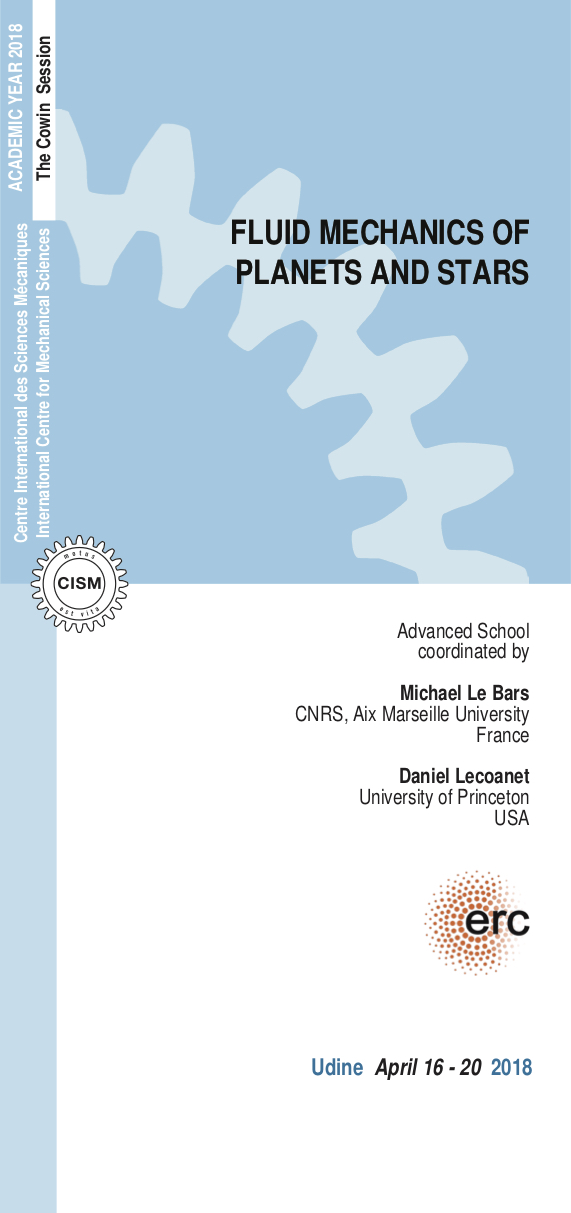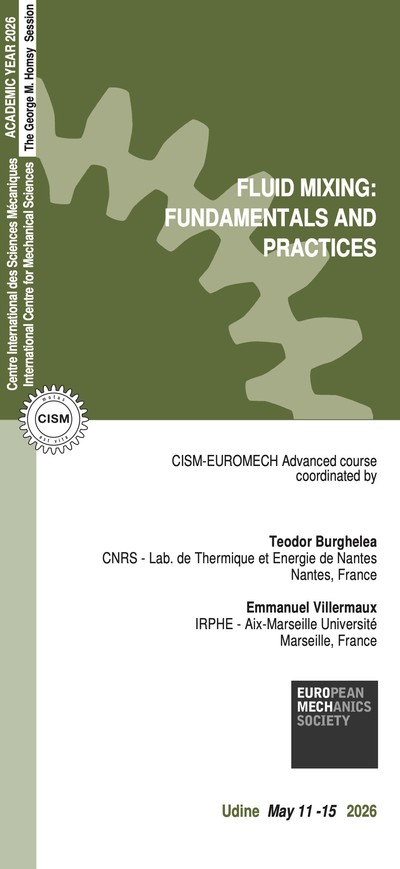Understanding the dynamics of planetary and stellar fluid layers, including atmospheres, oceans, iron cores, convective and radiative zones in stars... remains a tremendous interdisciplinary challenge. Beyond the challenge in fundamental fluid mechanics to understand these flows involving rotation, buoyancy, waves, instabilities, turbulence, at typical scales well beyond our day-to-day experience, a global knowledge of the involved processes is fundamental to a better understanding of the dynamics of celestial bodies. Among the numerous open questions, one can for instance mention: • How and where does the energy of the general ocean circulation cascade from the large climatic scales, where most of it is generated, to the smaller scales, where all of it is dissipated? • What are the relevant driving forces and flow regimes in planetary cores for explaining the generation of a large variety of magnetic fields by dynamo processes? • What are the prevalent force balances and physical mechanisms behind the large-scale features such as Jupiter's Great Red Spot and Jupiter's bands? • How are the various types of waves propagating in stellar interiors generated, and how can they be understood via asteroseismology? Interdisciplinary research in geo- and astrophysical fluid dynamics is also intrinsically multi-method. Indeed, the main obstacle to quantitative modeling and understanding of planetary flows stands in the extreme character of the involved dimensionless parameters. Relevant studies thus rely on the principle of dynamical similitude and scaling laws, sustained by theory, experiments and numerical simulations. Much effort has been devoted to understanding planetary and stellar flows within the various communities of Mechanics, Applied Mathematics, Engineering, Physics, Planetary and Earth Sciences, Astrophysics... While open questions actually rely on the same fundamental concepts and phenomena, lots of progress has been made within each enclosed domain, with only marginal cross- fertilizations. The objective of this CISM School is to go beyond this state, by providing participants with a global introduction and an up-to-date overview of all relevant studies, fully addressing the wide range of involved disciplines and methods. The course will be organized in two parts, each consisting of three chapters. The first part will focus on fundamental aspects of fluid mechanics, including introductory material and current research. Its three chapters will be devoted to waves, instabilities, and turbulence. The second part will focus on applications to topical geo- and astrophysical problems. Its three chapters will be devoted to planetary cores, atmospheres and oceans, and stars. All chapters will be pursued in parallel during the whole week, in order to highlight the close link between the models and their various applications. The target audience for this School is PhD students, postdoctoral and young researchers, in departments of Mechanics, Applied Mathematics, Engineering, Physics, Planetary and Earth Sciences, and Astrophysics. A background in fluid dynamics will be assumed, but no specific knowledge in any of the application domains will be requested. This school takes place within the research project FLUDYCO, supported by the European Research Council (ERC) under the European Union's Horizon 2020 research and innovation program (grant agreement No. 681835-FLUDYCO-ERC-2015-CoG).
Sutherland, Bruce R. "Internal Gravity Waves." Publisher: Cambridge University Press (2010).
Ogilvie, Gordon I. "Astrophysical fluid dynamics." Journal of Plasma Physics 82.3 (2016).
Le Bars, Michael, Cébron, David and Le Gal, Patrice. "Flows driven by libration, precession, and tides." Annual Review of Fluid Mechanics 47: 163-193 (2015).
Olson, Peter (ed). "Core Dynamics: Treatise on Geophysics." Publisher: Elsevier (2010).
Vallis, Geoffrey K. "Atmospheric and Oceanic Fluid Dynamics." Publisher: Cambridge University Press (2006).
Davidson, Peter A. "Turbulence in rotating, stratified and electrically conducting fluids." Publisher: Cambridge University Press (2013).
Renaud Deguen (None)
6 lectures on: Turbulence and Fluid mechanics of planetary cores, including: the basics of 3D and 2D turbulence; formation of iron cores (fragmentation and turbulent mixing); inner core solidification and dynamics; dynamo action and planetary magnetic fields; and Alfven waves.
Benjamin Favier (None)
6 lectures on: Turbulence and Fluid mechanics of planetary cores, including: quasi-geostrophic, shallow water, stratified, and rotating turbulence; and the asymptotic regime of convection in rotating cores.
Michael Le Bars (CNRS, Marseille, France)
6 lectures on: Instabilities, Atmospheric/oceanic fluid mechanics, and Fluid mechanics of planetary cores, including: inertial instabilities driven by libration, precession and tides; their influence in planetary cores and oceans; and vortices and turbulence in the oceans and in the atmospheres of gas giants.
Daniel Lecoanet (Princeton University, USA)
5 lectures on: Waves in fluids and in stellar interiors, including: sound and MHD waves; interactions between convective and radiative zones in stars; wave driven angular momentum transport; and heat transfer in compressible flows.
Gordon Ogilvie (University of Cambridge, UK)
6 lectures on: Waves in fluids and in stellar interiors, including: inertial and internal gravity waves; excitation, propagation and dissipation of internal waves; tidal dissipation in stars and giant planets; and the role of inertial and internal gravity waves in stellar interiors.
Bruce Sutherland (University of Alberta, Edmonton, Canada)
6 lectures on: Instabilities and Atmospheric/oceanic fluid mechanics, including: barotropic and baroclinic instabilities; the excitation of internal gravity waves in atmospheres and oceans; the propagation, reflection and destabilization of internal gravity waves; and mixing in stratified fluids.
The registration fee is 600.00 Euro + VAT*, where applicable (bank charges are not included). The registration fee includes a complimentary bag, four fixed menu buffet lunches (on Friday upon request), hot beverages, downloadable lecture notes and wi-fi internet access. Applicants must apply at least one month before the beginning of the course. Application forms should be sent on-line through the following web site: http://www.cism.it. A message of confirmation will be sent to accepted participants. Applicants requiring assistance with the registration should contact the secretariat at the following email address cism@cism.it. Applicants may cancel their course registration and receive a full refund by notifying CISM Secretariat in writing (by email to cism@ cism.it) no later than two weeks prior to the start of the course. Cancellation requests received during the two weeks prior to the start of the course will be charged a 50.00 Euro handling fee. Incorrect payments are also subject to a 50.00 Euro handling fee. Partial or full waiver of registration fee might be offered to any requiring applicant thanks to the financial support of the ERC through the research project FLUDYCO (grant agreement No. 681835-FLUDYCO-ERC-2015-CoG). Additionally, CISM can offer board and/or lodging in a reasonably priced hotel or student dormitory to a limited number of participants from universities and research centres who are not supported by their own institutions (preference will then be given to applicants from countries that sponsor CISM). All requests should be sent to CISM Secretariat by
February 16, 2018 along with the applicant's curriculum and a letter of recommendation by the head of the department or a supervisor, confirming the support provided by the Institute and the support requested to the School. Information about travel and accommodation is available on the web site www.cism.it, or can be mailed upon request.
* Italian VAT is 22%.





